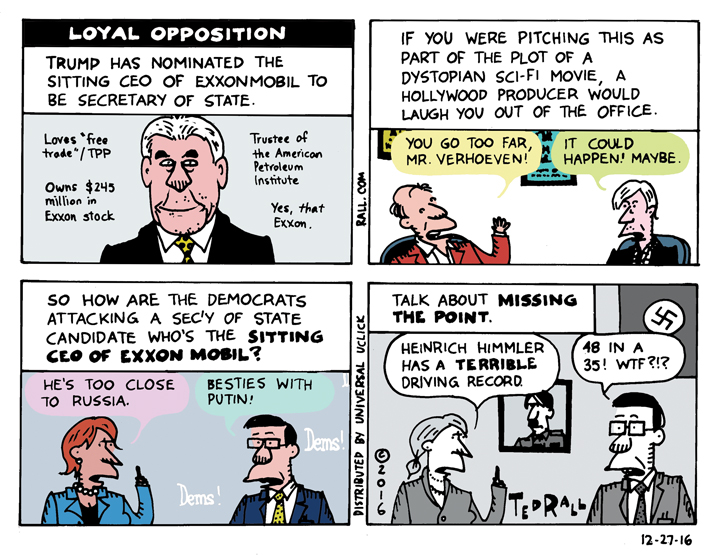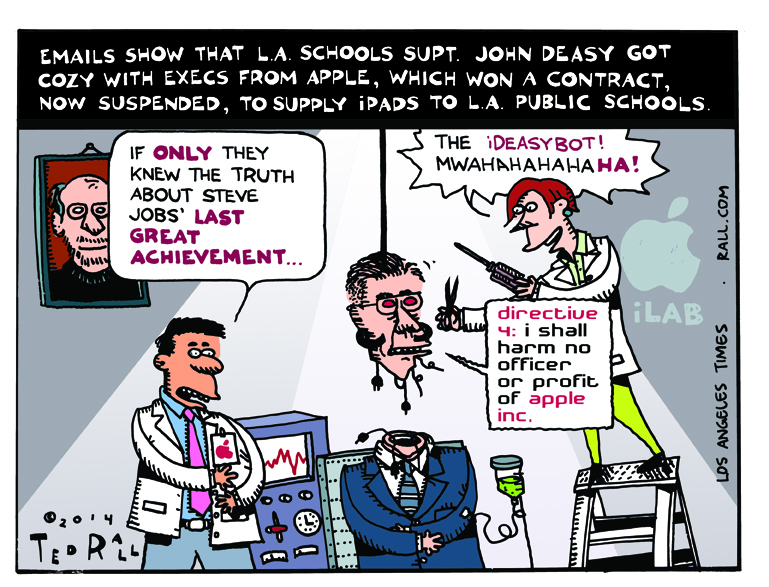Donald Trump has appointed Rex Tillerson, the sitting CEO of ExxonMobil, as Secretary of State. Which is really weird. Why are Democrats focused on something relatively minor: his relationship with Russia?
LOS ANGELES TIMES CARTOON: iDeasy
It sounded like a great idea at the time: L.A. would give students a boost into the 21st century by putting tech directly into their hands. The city’s United School District would buy 700,000 iPads from Apple, each loaded with educational software supplied by Pearson, the major textbook publisher.
“In June 2013, the [Los Angeles] Board of Education approved a deal with the Apple/Pearson team after senior staff assured members that its proposal was both the least expensive and highest in quality, Pearson provided curriculum; Apple was to supply iPads,” Howard Blume writes in the Times.
Apple’s sleek tablets appeared in 47 Los Angeles public schools during the 2013-14 academic year. Right out of the gate, however, it became clear that there were problems with the $1 billion contract. At a time of drastic budget cuts and brutal teacher layoffs, Apple charged L.A. more per device than other districts had paid. Pearson’s software was glitchy and incomplete. Schools weren’t set up to deal with security concerns — protecting the hardware, and blocking students from viewing inappropriate Internet content proved difficult. The district bought iPads at full cost even though their model was about to be replaced by a newer version. “Students at three campuses, for example, deleted security filters so they could browse the Internet — prompting officials to prohibit the use of the devices outside school. At times, officials also provided conflicting or incorrect answers about the project to a technology committee headed by school board member Monica Ratliff.”
When government bureaucracies wind up paying too much money to private contractors for goods and services that fall short — especially when the deal gets cut quickly — it’s reasonable to wonder whether the bidding process was open and transparent. Based on a series of emails disclosed at the request of the Times under the California Public Records Act, communications between L.A. schools superintendent and executives at Pearson and Apple, and the complaints of rivals who tried to land the district’s business, appear to indicate that an arm’s-length approach gave way to a level of institutional coziness that verges on outright political corruption.
“It looked like Apple was positioned to be the choice,” Chiara Tellini of Irvine-based Mind Research Institute, groused to Blume.
From Blume’s report:
In one email, from May 24, 2012, then-Deputy Supt. Jaime Aquino seems to strategize with higher-ups from Pearson, an international education-services company, on how to ensure that it got the job.
“I believe we would have to make sure that your bid is the lowest one,” wrote Aquino, who was an executive with a Pearson affiliate before joining L.A. Unified.
Deasy was one of the last to participate in that email exchange and made his comments after Aquino’s, which covered several topics.
“Understand your points and we need to work together on this quickly,” Deasy wrote. “I want to not loose [sic] an amazing opportunity and fully recognize our current limits.”
Charming.
(More from Blume: “On Sunday, Deasy said that the conversations were only about a ‘pilot program we did at several schools months before we decided to do a large-scale implementation. We did work closely on this pilot.'”)
Under fire and possibly facing an ethics probe, L.A. Unified has suspended the Apple/Pearson deal.
“You should make every bidder think they have a slim chance of getting the job,” Stuart Magruder, a school bond oversight committee member who questioned the deal at the time and got fired over it only to be later reinstated, told Times columnist Steve Lopez. Deasy “didn’t do that.” Lopez is not alone in wondering aloud whether Deasy’s days at L.A. Unified are numbered.
If not, they ought to be. In politics as in business, there’s little effective difference between the appearance of impropriety and outright corruption. Taxpayers have the right not to have to wonder whether their money is being safeguarded — and students have the right not to know they’re being shortchanged by a regime heavy on high tech and low on actual teaching.
SYNDICATED COLUMN: Why Are Americans Killing More Cops?
“Tough on Crime” Sentencing Laws Come Home to Roost
It sounds like the plot of the dystopian movie “Robocop”: policemen are getting shot like they’re going out of style.
Violent crime in general is decreasing. But more cops are being killed in the line of duty. According to the FBI, 72 police officers died under fire in 2011. That’s up 25 percent from 2010 and up 75 percent from 2008.
“The 2011 deaths were the first time that more officers were killed by suspects than car accidents, according to data compiled by the International Association of Chiefs of Police. The number was the highest in nearly two decades, excluding those who died in the Sept. 11 attacks in 2001 and the Oklahoma City bombing in 1995,” reports The New York Times.
According to a study by the John Jay College of Criminal Justice, “In many cases the officers were trying to arrest or stop a suspect who had previously been arrested for a violent crime.”
Why this spike in cop killing?
Experts blame a variety of factors for the carnage: the economic depression, low manpower due to budget cuts, policies that assign more cops to the most dangerous neighborhoods, and more aggressive patrolling of those areas, including “stop and frisk” stops of people the police deem suspicious. Maybe.
I think something else is missing in analyses of cop shootings: the motivation of the shooter.
Corporate media outlets cite the shooters’ prior records in order to imply: once a violent felon, always a violent felon. Sometimes that’s true. But not always. There’s more to it than that. Like law-abiding citizens, criminals employ rational decision-making strategies.
Harsh sentencing laws are killing police officers.
Imagine that you’re on parole in California, one of 24 states with “three strikes” sentencing laws. Let’s say you have two prior felony convictions. It doesn’t take much. One California man earned a “strike” for “violent assault”; he landed 25 years to life for stealing pizza from some kids. In Texas, a handyman who refused to refund $120.75 for a shoddy air conditioning repair landed his third strike; the U.S. Supreme Court upheld his sentence to life in prison with possible parole. And you can get two (or more) strikes from one criminal incident.
So imagine yourself in this situation:
Maybe you’ve got drugs in your automobile. Or you’re clean, but you’re not sure about what your passengers might be carrying. (In a car, one person’s contraband is everyone’s.) When you see flashing lights in your rearview mirror, you must choose:
Pull over and cooperate, knowing that you’ll get life behind bars?
Or do you take a terrible chance, shooting the officer and making a run for it? Harsh mandatory sentencing laws like “three strikes” make killing a cop a free gamble. Who knows? You might escape. If you get caught, the sentence will be no worse than if you’d done the right thing.
A joint study by the Long Beach Police Department and California State University—Long Beach found that “in the Los Angeles area (where there is a higher concentration of repeat offenders and three-strikes prosecution has been more actively pursued), there is a notable increase in…resisting and assaulting officers, and a significant increase (113% between 1996 and 2001) in two- and three-strikes crimes with a police officer victim.” A 2002 study by the National Institute of Justice found that three-strike laws “increase police murders by more than 40 percent.”
Another factor that authorities and “tough on crime” politicians fail to consider is how the increased militarization of civilian police forces dehumanizes them in the eyes of the public. Police outfitted in riot gear respond to peaceful protests attended by families with swinging batons and pepper spray. Traffic cops dress like they’re patrolling the Sunni Triangle rather than the suburbs, scowling at the taxpayers who pay their salaries as they sweat under their Kevlar vests.
When Princess Diana died, millions of Americans wept. Be honest. How do you feel when you hear that a cop has been shot to death? Odds are that you feel nothing at all.
During the first few years of the occupation, British officials ordered their forces to assume a less aggressive posture toward Iraqi civilians than their American counterparts. The Brits went light on the helmets and body armor, wearing uniforms that made them seem more like, well, policemen. Many eschewed sunglasses.
British casualty rates fell. Looking human, it turns out, is safer than protecting yourself. The thing is, killing is hard. The more human you appear, the more relatable you are, the harder it becomes, the guiltier your killer feels. Which presumably makes them less likely to kill again. (To make killing easier for its soldiers, the U.S. military deliberately reduces the available resolution on night-vision goggles, scrambling the appearance of the enemy to make him look alien.)
The more aggressive our policemen act, the more they look like military occupation troops than civilian peace officers, the easier it is for a gunman pull the trigger.
Remember this article the next time you get pulled over. Ask yourself: how do I feel? Odds are, the answer will involve a mixture of fear and contempt. Then imagine what you’d do if you were one arrest away from life in prison—and you had a gun.
(Ted Rall’s next book is “The Book of Obama: How We Went From Hope and Change to the Age of Revolt,” out May 22. His website is tedrall.com.)


